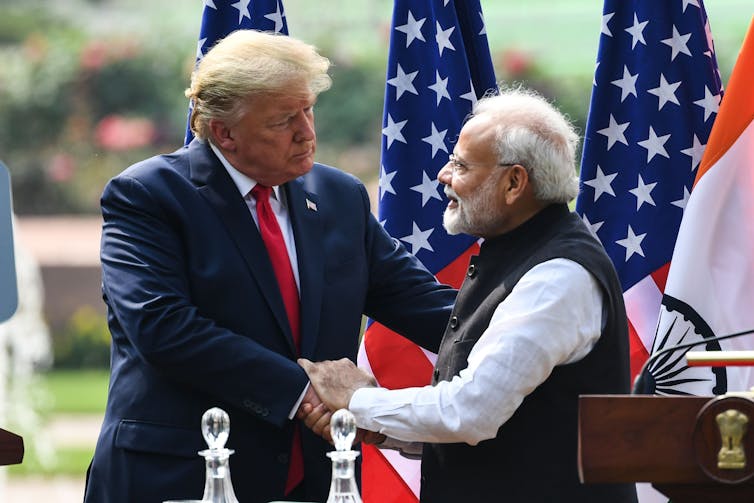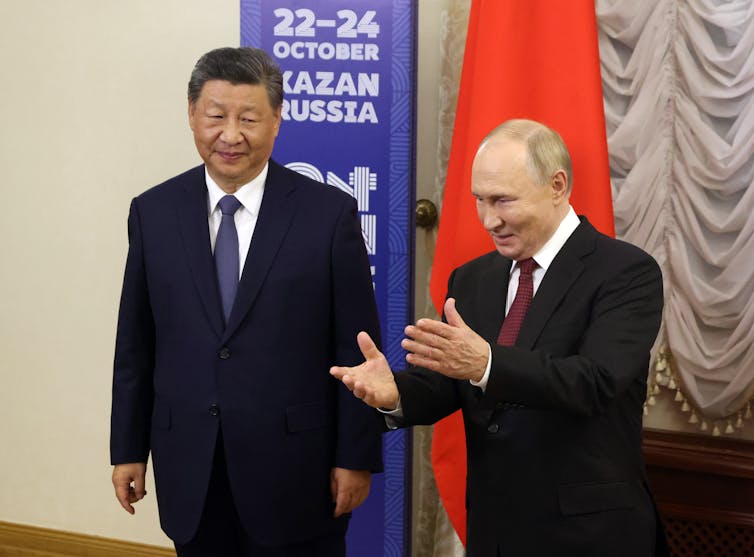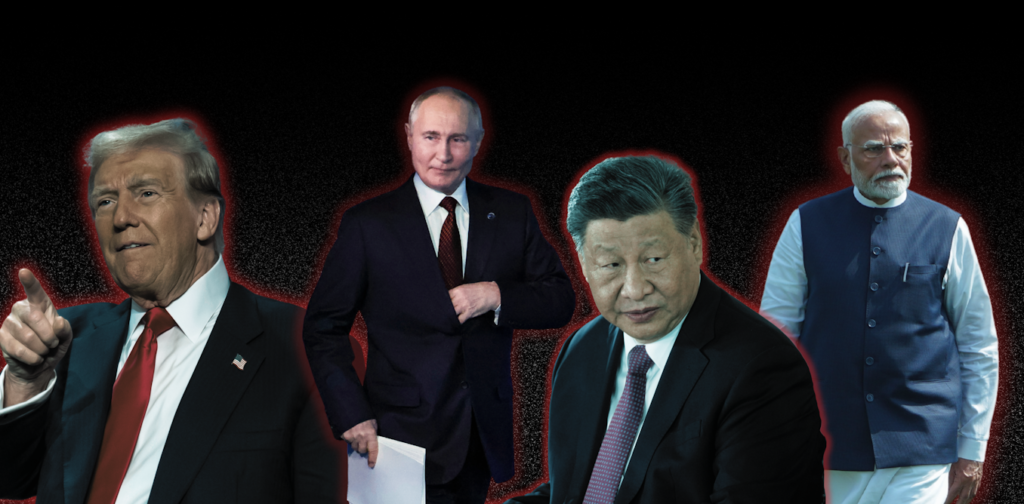The election of Donald Trump to a second term as president has sparked widespread concern that authoritarian trends are imminent in the United States.
How that will play out is still speculation, at least for now. But evidence from President Trump’s first term as well as his post-election campaign policies and Cabinet nominations suggests that these concerns are not unfounded.
But another way to look at this is that President Trump’s return simply reflects the reality of other powers in the international system. China, Russia, and India have all exhibited similar political pathology for some time.
With their collective power and influence in determining the nature of world order, Trump’s victory signals the expansion of a deep authoritarian era in world politics.
The characteristics of this early period of what we might call “Pax authoritarianism” can be seen in a variety of ways as these Four Horsemen of Authoritarianism advance their policies and programs.
strongman politics
Donald Trump and his counterparts, China’s Xi Jinping, Russia’s Vladimir Putin, and India’s Narendra Modi, are all bombastic, divisive, and confrontational leaders. They epitomize the politics of the strong, where power is concentrated in one individual who aspires to be all-powerful.
They share similar psychological characteristics with alpha males and seek to dominate for long periods of time as well as develop a cult of personality around themselves.
In 2018, Mr. Xi removed term limits for the president from China’s constitution. In 2020, President Putin amended Russia’s constitution, allowing him to rule until 2036, creating a situation known as “eternal politics.”
Mr Modi, who has been in power since 2014, has won India’s last three elections. Accused of having a god complex, his success depended on mainstreaming Hindu nationalism, taking control of the legal system, and rewriting India’s history.
President Trump has also teased the idea of a third term (which is impossible under current constitutional rules), saying, “We’ll just have to figure it out.”

Getty Images
restrict human rights
Each of these leaders has overseen governments that have sought to narrow and restrict human rights. These include restrictions on freedom of speech and expression in Russian media, attacks on journalists and protesters in India, and purges of dissidents in China. In all three countries, this involves the use of legal mechanisms to suppress dissent.
Reports after Trump’s victory suggest that he also wants to punish and repress protests and dissent. The increasing politicization of the U.S. Supreme Court is consistent with similar trends in three other countries.
This has been likened to the transition from the rule of law (which underpins a free and open society) to the “rule of law” (where the law becomes a tool of control).
Globally, there are warnings that the decline in freedom of speech, association and expression threatens the fundamental fabric of civil society. The 2024 State of Civil Society Report by the watchdog group Civicas estimates that 72% of the world’s population currently lives under authoritarian regimes.
attack a minority
The first Trump administration actively discriminated against ethnic minorities, LGBTQ people, people with disabilities, and immigrants.
President Trump issued a travel ban in 2017 that closed the U.S. border to Muslims, but his plan to deport up to 13 million illegal immigrants has become a mainstay of his 2024 election campaign.
Attacks against minorities and foreigners are common in Russia, and racism in the country has been described as “out of control” by Amnesty International. Since 2014, violence and discrimination against India’s 200 million Muslims has increased significantly under Prime Minister Modi’s Hindu nationalist Bharatiya Janata Party (BJP).
The Modi government’s actions actively discriminate against Muslims in employment, education, justice, and housing, particularly in Kashmir and Assam.
These are consistent with China’s actions in Xinjiang and Tibet, where ethnic minorities are exposed to fundamental human rights violations. The Chinese government is also building a national social credit system aimed at increasing public trust in the Chinese Communist Party (CCP) and creating a society of “obedient subjects.”

Getty Images
Weakening of the electoral system
Although ostensibly democratic, the political and electoral systems of the United States, India, and Russia have clear weaknesses that undermine claims of electoral equality, fairness, and plurality.
Although not as overtly authoritarian as China (which has been under one-party rule by the Chinese Communist Party since 1949 and has consistently silenced opposition), Russian elections are inherently non-competitive and democratic. It’s just a pretense.
In the United States, gerrymandering, voter suppression, and massive corporate donations have tilted the political landscape in favor of special interests.
The same is true of India, which has moved into a form of “electoral dictatorship” and is now described by the watchdog group Freedom House as only a “partially free democracy.” These trends are further exacerbated by India’s persistent intergenerational political dynasties and powerful political donors.
Surveillance and security
All of these authoritarian tendencies are supported by modern surveillance structures, directed not just outwardly but also inwardly against their own citizens, enabled by Big Tech and now AI. Masu.
What has been described as “algorithmic authoritarianism” takes many forms. China’s social credit system uses such technologies primarily to instill social control through financial instruments.
India’s central surveillance system allows government agencies to monitor all mobile, landline and internet communications with minimal legal restrictions. The far-reaching impact of Russia’s capabilities has resulted in a “cyber concentration camp” of “total digital surveillance.”
In the United States, whistleblower Edward Snowden exposed mass surveillance of phone records in 2013, which was found to be illegal in 2020. The current alliance between Trump and Elon Musk has potential implications for the Trump administration’s approach to AI and national security. Using social media platforms to increase Trump’s political support.
With the return of President Trump, authoritarianism has normalized and intensified internationally, making it the rule rather than the exception. America’s authoritarian tendencies are now part of a broader global pattern that threatens democratic forces everywhere.



